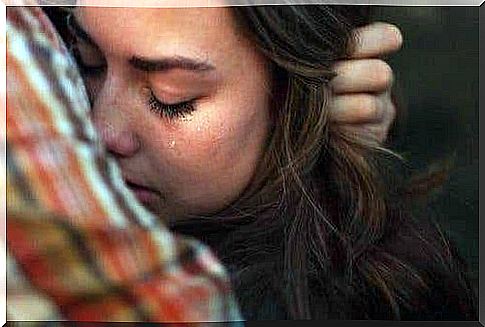The Pain Of Mourning A Missing Person

Grieving a missing person is really difficult, because it comes with a feeling of emptiness. An emptiness so deep that it makes you reformulate your goals and the meaning of your life. The loss creates a real grief, more obvious than anything else. But what happens when this pain is really strong and also constantly recurring? The pain of not knowing what happened to a missing person has a huge impact on all of their loved ones. In this article, we will take a closer look at this topic.
To begin with, grief is a set of phenomena that occur after the loss. Things that go beyond the psychological and that include the physical, anthropological, economic, social and spiritual. A loss is “a lack of people, things or mental perceptions which triggers affective, cognitive and behavioral reactions” (Tizón, 2013).

To mourn a missing person
We feel sad when we are suddenly and unexpectedly separated from someone we love. There can be several reasons why a person disappears. But it has a huge impact in all cases. This is due to the silence and lack of information that haunts those who are left behind.
After a person has disappeared, the family often tries to follow in their footsteps to find clues. But the disappearance can be caused by a crime and there may be no way to find the truth. And in these cases, it can be dangerous to get too close to the truth, or at least not supported by the authorities.
When a person disappears and there are no traces, it is difficult to know if they are dead or alive. This situation makes it difficult to grieve. One of the most common questions when grieving a bereaved person is: How do I accept the loss when I do not even know what happened?
Why do we talk about delayed pain?
Missing a missing person leads to a delayed pain because you often have an expectation and a hope of finding your loved one. It is as if you see a light in the middle of the storm that says you should not give up, that the lost will come back.
So it is a kind of intermittent pain, suspended and paused due to anxiety; an anxiety that creates both a distance and a closeness to the lost. It’s still difficult because the grief is there, off. Alternate hope and despair also lead to deep stress and anxiety that does not go away.
There is a sense of insecurity when mourning a bereaved person. Especially when there is a forced disappearance. It leads to a lot of pain, a type for which words can not be found. A type of pain that you do not know how to deal with because this loss is so different from everyone else.
How to face the situation of mourning a missing person
How do I accept a loss of someone who can come back? What words should be used to describe this enormous pain? How do I keep going even though I feel so empty?
People go through different types of grief throughout their lives. Some are the natural result of a change in your life cycle. Then there are those you will meet but who you have not even begun to imagine. The truth is that meeting them is a big challenge. But even when it comes to mourning a missing person, there are ways to solve it.
Grief consists of “the psychological processes of accepting the new inner and outer reality of the subject,” according to Jorge L. Tizón, a man who studied this subject.
In theory, we find suggestions for different stages of grief. However, what it means to mourn a missing person is so different that it is not always possible to follow the typical process.
It is when a grieving person somehow has access to the remains of the lost that they can begin to accept it. But in the case of a lost person, this option does not exist. Instead, there is only uncertainty. Therefore , as a survivor, you may feel guilty if you choose to assume a death that has not been determined for sure. In addition, you may even feel that you are killing your loved one by assuming yourself.

What happened?
The family of a missing person usually insists on thinking of the missing person as if he or she were alive. At least according to what Ramírez Guerrero y Salvador says in an article published in the Revista Internacional de Buena Consciencia , 2014. This situation prevents the bereaved from overcoming their grief.
So how do you work through grief? It is difficult to put into words something that causes you a lot of anxiety. However, you can try other types of communication instead. For example, you can try to express yourself through art. This is a means of communicating in a different way. A method where your subconscious can emerge. It also gives you the opportunity to take one day at a time and become a little aware of what happened. You find symbols and can then put words into them.
Let their perseverance carry you
You can also lean on your endurance, which makes it possible to overcome what has affected you. For this to be possible, you must first find a meaning in your own life. You do not have to stop loving or missing a loved one. Rather, evaluate your “here and now” and keep moving forward. It will be less painful. You can also always seek help from a psychologist.
Grieving a bereaved person is not an easy task. It is a pain that is difficult to describe in words. But you can put words to grief if you process it. This is because the processing consists of accepting the loss, but not giving up your memories and experiences. Finally, endurance is a great way to deal with the situation, while art can have a great mobilizing power that builds the bridges that help you find meaning in your life and your pain.









